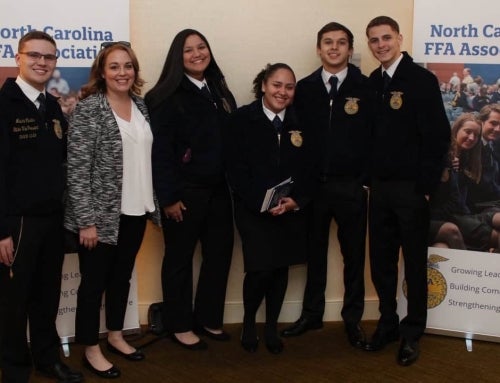What is the FFA federal charter?
A federal charter was granted to the National FFA Organization in 1950 when Public Law 81-740 was passed by the U.S. Congress. The Charter serves as National FFA’s articles of incorporation and as the organization’s governance document. Public Law 105-225, passed in 1998, provided technical revisions to the original federal charter.
Congress has chartered around 100 organizations over time, and six of them have affiliations with a federal agency. National FFA is the only chartered organization that has stipulations within the charter mandating that the U.S. Department of Education selects or approves a majority of its members of the board of directors, including the national advisor, board chair and other board positions.
Why is National FFA revising the FFA federal charter?
The need for change originates with issues National FFA has faced with seats left open by the U.S. Department of Education on the National FFA Board of Directors. Two board seats remain unfilled currently after numerous rejections by the Department. In light of the difficulties, both FFA and the Department have agreed the relationship as it stands is not working optimally and needs to be addressed via the FFA federal charter. While opening up the document for revisions, FFA has also chosen to finally add language that confirms the integral nature of FFA in the agricultural education classroom.
What changes are being made?
Through this charter revision, National FFA is seeking to accomplish many objectives that will sustain the future of the organization and place responsibility for the organization in the capable hands of the National FFA Board of Directors. Changes include:
- The U.S. Department of Education will select one employee to serve as a member of the National FFA Board of Directors.
- The charter will more clearly explain and strengthen the integral nature of the three component model of agricultural education, leadership development through FFA, and work-based and experiential learning for students.
- Formalization under the law of the longstanding focus of FFA and agricultural education on preparing students for traditional farming careers and the wide range of unique modern careers available in agriculture, food and natural resources.
- An opportunity for FFA to increase self-governance and the flexibility to select and install a board of directors that reflects the integral relationship of FFA with school-based agricultural education, along with the diverse priorities and career areas of interest to FFA members.
- New opportunities for FFA to work collaboratively with the U.S. Department of Education, the U.S. Department of Agriculture and other federal agencies to strengthen FFA and school-based agricultural education.
- Modernized communication methods that provide opportunities to reach more students with the message of FFA and youth leadership development.
- Flexibility for National FFA to have a minimum of six national officers, providing the option of expanding the number of national officers to increase membership reach as the organization continues to grow.
How will this amendment process work?
The National FFA Organization’s Federal Charter Amendments Act has been introduced to the 116th Congress. Representatives Jim Langevin (D-RI) and GT Thompson (T-PA) introduced H.R. 439 on January 10. Senators Todd Young (R-IN), Doug Jones (D-AL), James Lankford (R-OK), and Christopher Coons (D-DE) introduced S. 112 on January 15.
After the introduction, the bills were referred to the judiciary committee on each side of Congress. National FFA will continue to seek additional support and legislative co-sponsorship from other members of Congress for the passage of the charter amendments. The desired result would be for the judiciary committees to review the bill and refer it on for passage. The bill will require passage by the full House of Representatives before heading to a similar process in the Senate. When both sides have passed the bill, it will then be submitted to the president to be signed into law.
Were National FFA delegates involved in the decision to revise the charter?
National FFA delegates have the power to discuss the charter and did so during new business at the 2017 National FFA Convention & Expo. No recommendation was offered to the board of the directors as a result of the discussion. Governance decisions such as this federal charter amendment are the legal responsibility of the board of directors. Prior to taking action, the board incorporates recommendations from the delegates and the views of the six national FFA officers that are elected by the delegates as its student voice. With passage, delegates will be responsible for any changes to the organization’s constitution and bylaws in order to align with the amended federal charter, such as selecting board member roles.
What role did the delegates play in authorship and approval of the original 1950 FFA federal charter (81-740) and the revised 1998 charter (105-225)? Is this being handled differently?
Historical records indicate delegates did not play a role in the origination of the FFA federal charter before it was passed into law in 1950. The 1998 revision to the federal charter was carried out by the board of directors. A policy committee was appointed by the board in July 1997 to begin the amendment process. The board accepted the policy committee’s revisions and began the legislative process to pass the amended charter.
How will the charter strengthen the three-component model of agricultural education?
It’s a common thought that the current FFA federal charter guarantees that FFA is an integral part of agricultural education instruction. While it provides a foundation to that idea, the truth is “integral” is merely implied. For example, an official letter from the U.S. Department of Education may have helped the case in the past of local FFA chapters or agricultural education departments when they faced challenges from local administrations or school boards. The Department no longer produces such documents or assistance because the current charter does not specifically call for the integral nature of agricultural education and FFA.
By revising language in the current charter amendment (Section 70902 of title 36, U.S. Code) stating the FFA purpose, the role of FFA becomes part of federal law. This is direct benefit to students and teachers in the event programs come under scrutiny by school boards or administrators.
How does the charter revision affect students and teachers?
Students and FFA advisors will find that this revised charter gives FFA more strength to be an integral part of agricultural education instruction. The revised charter also allows for the student delegates to determine which roles will be represented on the National FFA Board of Directors via the Constitution and Bylaws.
Does the charter revision strengthen the value of an FFA-driven agricultural education program?
We firmly believe this charter revision will increase the value of an FFA component of an agricultural education department because the federal charter, for the first time, will put into law the great importance of the three-circle model when it comes to educating young people in this area.
How will the change in the charter make FFA any different than 4-H, Scouts, etc.?
FFA has always been a bit different than great extracurricular organizations like 4-H, Scouts and others because FFA members/students become a part of the program only through intracurricular instruction. The amended charter maintains – and strengthens – that unique and strong connection between FFA and the agricultural education classroom.
What happens to FFA and agricultural education if this charter revision does not pass?
Should the amendment fail to be enacted, FFA will continue to have empty seats on the board of directors and a lack of codified federal recognition for FFA being an integral part of agricultural education instruction. The legislation would need to be re-introduced in the next session of Congress and begin the legislative process anew, while governance issues would continue to hamper the work of the National FFA Board of Directors. Additionally, in the event of an unexpected departure of current board chair Dr. Steve Brown, National FFA runs the risk of a new appointed board chair not having experience or knowledge relevant to FFA and agricultural education.
When did National FFA last attempt to fill the U.S. Department of Education’s empty seats on the National FFA Board of Directors? Why have they been rejected?
FFA has attempted as recently as the spring of 2018. Changes to the Department’s staffing levels and internal policies over time have shifted the Department’s desire to have such a heavy responsibility to the National FFA Board of Directors. Those changes have manifested in the board having empty seats, and the only way to correct the issue is to amend the FFA federal charter. The Department has indicated both in meetings with FFA leaders and by declining to approve its full allotment of board members that it desires to change its role on the board of directors. The Department has agreed to fill one board seat.
Has the board been unable to accomplish any business while operating with open seats?
The board has not yet had an issue obtaining quorum with the board of directors, but we are far too close to the cutoff line to be comfortable in the event of unforeseen board absences during official business. It’s better for all involved to have a fully-seated board of directors as it provides a wider range of viewpoints and experiences from board members.
What changes in the revised charter in terms of hiring the chair of the board of directors?
The only difference between the current charter and the amended charter regarding the National FFA board chair is how that position is selected on the board of directors. The amended charter would allow the board to select the person in that position; the current charter mandates that the U.S. Department of Education select that individual.
Would Dr. Steve Brown’s position and multiple roles he plays for FFA and agricultural education be affected?
Dr. Brown would remain in his role as educational specialist at the U.S. Department of Education, but the Department would no longer appoint the board chair, FFA advisor and executive secretary positions to FFA. The Department has indicated Dr. Brown will continue to serve as its selected representative on the board of directors.
What is the budget impact of the revision on the National FFA Organization?
Expenses to FFA would not increase with the charter revision because board positions are unpaid.
Will the National FFA Advisor be a volunteer?
This will be determined by a future revision to the National FFA Constitution and Bylaws approved by the National FFA Delegates. A committee appointed by the board of directors to review the constitution and bylaws is considering the issue, and the board will take the committee’s work to make a recommendation to the delegates.
What are the main benefits for FFA members and teachers of the amendment in the view of National FFA?
This revision will codify the integral nature of FFA and references our constitution and bylaws as our governing documents which the delegates play a role in determining. This allows delegates and the board the option to make important organizational changes as needed without going to Congress.
What potential changes can FFA make without going to Congress under the new FFA federal charter?
The amended charter allows the FFA board of directors and the student delegates to take a more active role in several ways. First, the delegates will be able to define specific board member roles via the FFA constitution and bylaws. Additionally, the amended charter offers flexibility in membership communication methods and national officer selection without requiring an act of Congress.
If the charter passes, will it mean more work and documentation for teachers?
No additional work or documentation will be required of teachers. This process will strengthen language in the charter that specifically calls out the integral nature of FFA in classroom instruction.
Will this revision affect Perkins funding?
The Carl D. Perkins Career and Technical Act of 2006 outlines formulas for allocation of dollars for eligible programs. Career and technical student organizations are not a part of that formula. The FFA federal charter has no impact or bearing on Perkins funding formulas and pertains only to FFA governance, not agricultural education governance.
How does the reduction of education-related seats keep the three-component model intact?
There will not be a reduction in education-related seats on the board of directors. Instead, the amended federal charter allows seats on the board to be defined by the constitution and bylaws as approved by the delegates. National FFA will recommend to delegates that the constitution and bylaws include four state supervisor positions along with representatives of agricultural education recruitment organizations.
Will the revised charter cause state governments to alter relationships with state FFA organizations?
National FFA cannot control how states manage their agricultural education and FFA governance. However, we believe amending the governance document of National FFA only strengthens the integral nature of FFA and classroom instruction and reaffirms the intracurricular focus of FFA.
How has the revision process been communicated to FFA stakeholders?
National FFA has included updates about the entire charter amendment process in all of its communication platforms in an effort to reach as many people as possible. State leaders have been briefed several times in-person and electronically. Updates have been communicated via in-person FFA LPS and FFA leadership visits, the FFA New Horizons website, multiple email lists, videos and FFA social media. FFA also worked in conjunction with NAAE in January 2017 and January 2018 with teacher leaders in addition to web conferences with NASAE to discuss the issue.
What if I have concerns about this revision? Who should I contact?
For specific questions about the legislative text or process, please contact Riley Pagett, FFA director of advocacy and government relations.
General questions about the direction of National FFA or the context of the amendment to the federal charter may contact any member of the National FFA senior leadership team – Mark Poeschl, Molly Ball or David Schapker.











